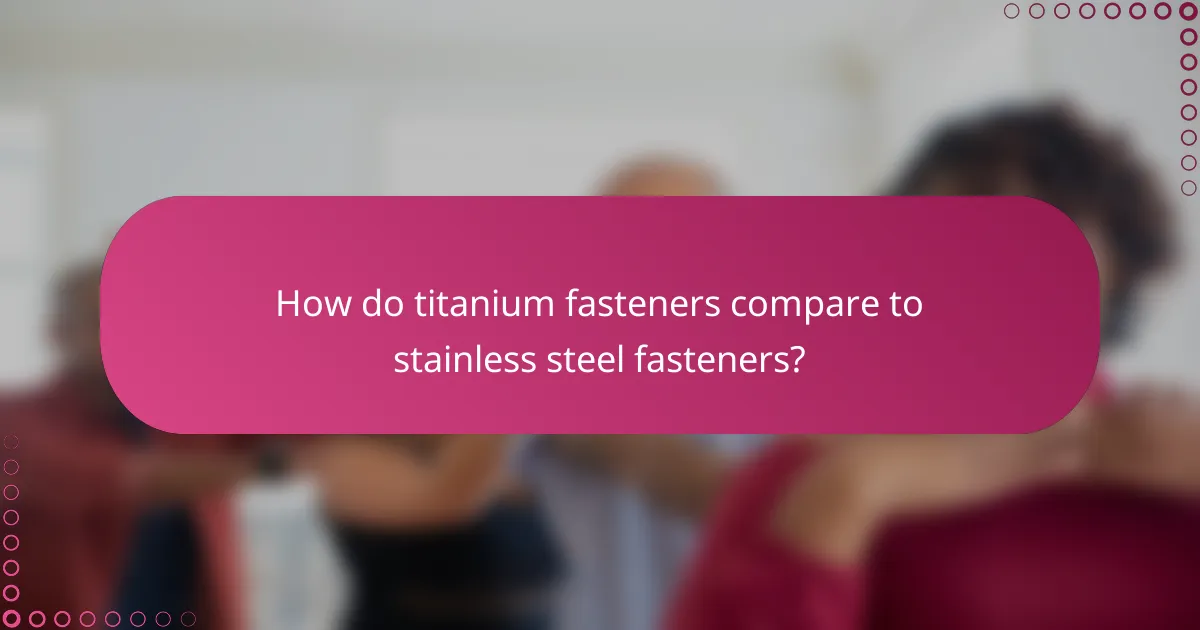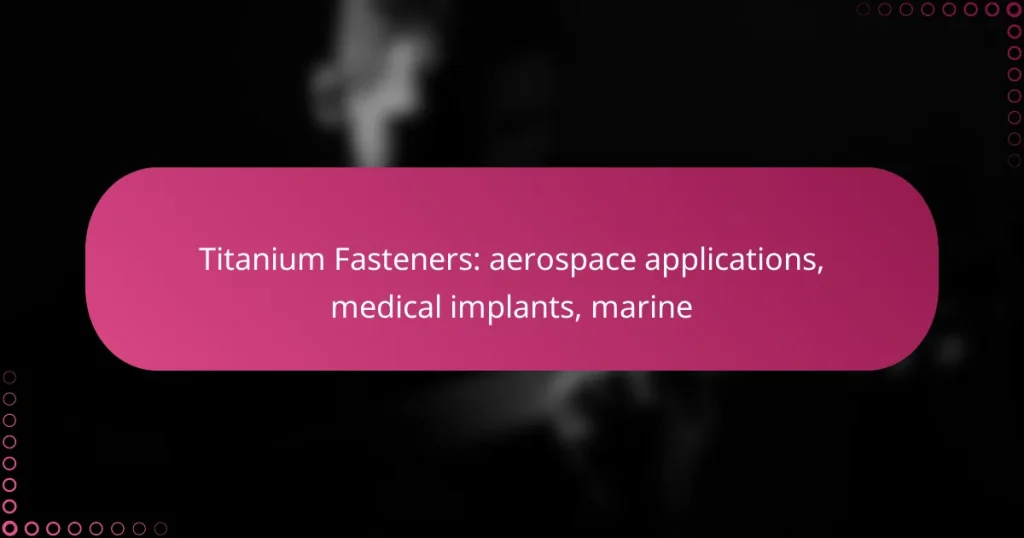Titanium fasteners are crucial in various high-performance applications, including aerospace, medical, and marine industries. Their unique combination of strength, lightweight properties, and exceptional corrosion resistance makes them ideal for demanding environments, ensuring safety and reliability. In aerospace, they meet stringent industry standards, while in medical implants, they provide biocompatibility and stability. Additionally, their durability in marine settings ensures longevity even in harsh conditions.

What are the best titanium fasteners for aerospace applications?
The best titanium fasteners for aerospace applications are those that offer a combination of strength, lightweight properties, and resistance to corrosion. Aerospace-grade materials must meet stringent industry standards to ensure safety and performance in demanding environments.
Aerospace-grade titanium bolts
Aerospace-grade titanium bolts are designed to withstand extreme conditions, including high stress and temperature variations. Typically made from titanium alloys such as Ti-6Al-4V, these bolts provide excellent tensile strength while remaining lightweight, making them ideal for aircraft structures.
When selecting titanium bolts, consider factors like the specific application, load requirements, and environmental conditions. Ensure that the bolts meet relevant aerospace standards, such as those set by the FAA or EASA, to guarantee reliability.
High-strength titanium screws
High-strength titanium screws are essential for applications requiring secure fastening under dynamic loads. These screws often feature specialized threads and coatings to enhance grip and prevent loosening due to vibration.
For optimal performance, choose screws that are compatible with the materials they will be fastening. It’s advisable to consult manufacturer specifications to ensure the screws meet the necessary strength and corrosion resistance criteria for aerospace use.
Corrosion-resistant titanium nuts
Corrosion-resistant titanium nuts are crucial in aerospace applications where exposure to harsh environments is common. Made from titanium alloys, these nuts resist oxidation and degradation, ensuring long-term durability.
When selecting nuts, consider the compatibility with the corresponding bolts and screws, as well as the specific environmental conditions they will face. Look for nuts that comply with aerospace standards to ensure they can handle the required loads and resist corrosion effectively.

How are titanium fasteners used in medical implants?
Titanium fasteners are essential in medical implants due to their biocompatibility, strength, and resistance to corrosion. These properties make them ideal for securely anchoring implants within the human body, ensuring long-term stability and minimal adverse reactions.
Biocompatible titanium screws
Biocompatible titanium screws are commonly used in orthopedic and dental implants. Their compatibility with human tissue reduces the risk of rejection and inflammation, making them suitable for long-term use. These screws typically come in various sizes and designs to accommodate different surgical needs.
When selecting titanium screws, consider factors such as the specific application, load requirements, and the patient’s individual anatomy. Ensuring proper sizing and placement is crucial for optimal healing and functionality.
Custom titanium plates for implants
Custom titanium plates are often designed for specific surgical applications, such as fracture fixation or joint reconstruction. These plates can be tailored to fit the unique contours of a patient’s anatomy, providing enhanced stability and support. The customization process typically involves advanced imaging techniques and CAD software.
Surgeons should evaluate the mechanical properties and thickness of the plates to ensure they meet the required strength without adding unnecessary weight. Proper fixation techniques are also essential to prevent complications during the healing process.
Long-lasting titanium rivets
Long-lasting titanium rivets are utilized in various implant applications, particularly where permanent fixation is necessary. Their resistance to corrosion and fatigue makes them suitable for environments within the body, where other materials might fail over time. These rivets are often used in conjunction with other titanium components.
When using titanium rivets, it is important to assess the load-bearing requirements and the potential for stress concentrations. Proper installation techniques will help ensure the longevity and effectiveness of the riveted joints in medical implants.

What are the advantages of titanium fasteners in marine environments?
Titanium fasteners offer significant advantages in marine environments due to their exceptional resistance to corrosion, lightweight properties, and high strength. These characteristics make them ideal for use in various marine applications, ensuring longevity and reliability in harsh conditions.
Resistance to saltwater corrosion
Titanium fasteners are highly resistant to saltwater corrosion, which is a critical factor in marine environments. Unlike steel or aluminum, titanium forms a protective oxide layer that prevents further oxidation, making it suitable for prolonged exposure to seawater.
This corrosion resistance means that titanium fasteners require less maintenance and have a longer lifespan, reducing the need for frequent replacements. As a result, they are often the preferred choice for boat manufacturers and marine engineers.
Lightweight and strong titanium bolts
Titanium bolts are known for their impressive strength-to-weight ratio, making them an excellent choice for marine applications where reducing weight is essential. They are significantly lighter than steel bolts while maintaining comparable or superior strength, which can enhance the overall performance of marine vessels.
This lightweight nature allows for easier handling and installation, contributing to improved fuel efficiency and performance in boats and ships. Choosing titanium bolts can lead to better design flexibility and reduced structural load.
Durable titanium screws for marine use
Durable titanium screws are specifically designed to withstand the rigors of marine environments. Their resistance to corrosion and fatigue makes them ideal for securing components in boats, yachts, and other marine structures.
When selecting titanium screws, it’s essential to consider factors such as thread design and coating options to enhance their performance further. Using high-quality titanium screws can prevent failures and ensure the integrity of marine installations over time.

What factors should be considered when selecting titanium fasteners?
When selecting titanium fasteners, key factors include load-bearing capacity, environmental resistance, and compatibility with other materials. These considerations ensure the fasteners perform effectively in demanding applications such as aerospace, medical, and marine environments.
Load-bearing capacity
The load-bearing capacity of titanium fasteners is crucial for their performance in high-stress applications. It is essential to choose fasteners that can withstand the specific loads they will encounter, which can vary widely depending on the application. For instance, aerospace fasteners must support significant weight while maintaining structural integrity at high altitudes.
When evaluating load-bearing capacity, consider the grade of titanium used, as different grades offer varying strengths. For example, Grade 5 titanium is commonly used for its excellent strength-to-weight ratio, making it suitable for both aerospace and medical applications.
Environmental resistance
Titanium fasteners are known for their exceptional resistance to corrosion, making them ideal for marine and medical environments. Their ability to withstand harsh conditions, such as saltwater exposure or body fluids, is a significant advantage. However, it is important to assess the specific environmental factors that the fasteners will face.
For marine applications, look for fasteners that meet standards for saltwater resistance, while in medical settings, ensure they comply with biocompatibility regulations. This will help prevent degradation and ensure longevity in challenging environments.
Compatibility with other materials
Compatibility with other materials is a vital consideration when selecting titanium fasteners. Titanium can react with certain metals, leading to galvanic corrosion, which can compromise the integrity of the assembly. It is essential to evaluate the materials that will be used in conjunction with the titanium fasteners.
For example, when pairing titanium fasteners with aluminum components, use insulating materials to prevent direct contact. Additionally, consider the thermal expansion properties of the materials involved, as differences can lead to stress and potential failure in high-temperature applications.

How do titanium fasteners compare to stainless steel fasteners?
Titanium fasteners are generally lighter and more corrosion-resistant than stainless steel fasteners, making them suitable for demanding applications in aerospace, medical, and marine environments. However, they tend to be more expensive, which can be a significant factor in material selection.
Weight differences
Titanium fasteners are approximately 40% lighter than their stainless steel counterparts, which can lead to significant weight savings in applications where every gram counts, such as in aerospace engineering. This reduced weight can improve fuel efficiency and overall performance in aircraft and spacecraft.
For example, using titanium fasteners in an aircraft can contribute to a lower overall weight, enhancing payload capacity or reducing fuel consumption. In contrast, stainless steel fasteners, while heavier, may be more readily available and easier to source for some applications.
Corrosion resistance comparison
Titanium fasteners exhibit superior corrosion resistance compared to stainless steel, particularly in harsh environments such as marine applications where saltwater exposure is common. Titanium forms a protective oxide layer that prevents further oxidation, making it ideal for long-term use in corrosive settings.
Stainless steel, while also resistant to corrosion, can suffer from pitting and crevice corrosion in certain conditions, especially if not properly passivated. For critical applications, such as medical implants, the enhanced corrosion resistance of titanium is often a decisive factor.
Cost analysis
The cost of titanium fasteners is typically higher than that of stainless steel fasteners, often ranging from two to five times more expensive depending on the grade and specifications. This higher cost can be justified in applications where weight savings and corrosion resistance are paramount.
When considering budget constraints, it is essential to evaluate the long-term benefits of titanium fasteners against their initial expense. In aerospace and medical fields, the durability and performance of titanium can lead to lower maintenance costs and longer service life, potentially offsetting the higher upfront investment.

What are the emerging trends in titanium fasteners?
Emerging trends in titanium fasteners focus on advancements in manufacturing techniques, particularly 3D printing, and the growing demand for lightweight, corrosion-resistant materials in aerospace, medical, and marine applications. These trends are driven by the need for enhanced performance, customization, and cost efficiency.
3D printing of titanium fasteners
3D printing, or additive manufacturing, of titanium fasteners allows for the creation of complex geometries that traditional machining cannot achieve. This method reduces material waste and enables rapid prototyping, making it ideal for industries requiring customized components, such as aerospace and medical sectors.
When considering 3D printing for titanium fasteners, it’s essential to evaluate the specific printing technology, such as selective laser melting (SLM) or electron beam melting (EBM). Each technology has its strengths, with SLM typically offering finer details and EBM being more efficient for larger parts.
Common pitfalls include underestimating the post-processing requirements, which can add time and cost, and not fully understanding the mechanical properties of printed titanium parts. Ensuring compliance with industry standards, such as ASTM F3001 for titanium alloys, is crucial for maintaining quality and performance.


